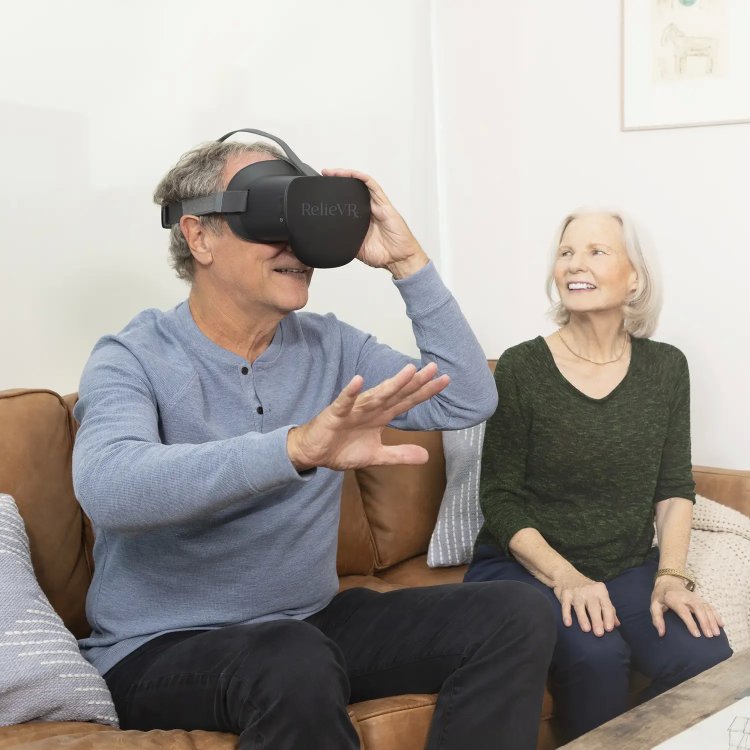Clinical Study Shows VR Treats Pain Consistently Across Sociodemographic Categories
What You Should Know: – AppliedVR, an immersive therapeutics (ITx) pioneer advancing a novel, virtual reality-based approach to medicine, today announced results from a secondary analysis of a large randomized controlled trial (RCT) that evaluated whether socio-demographic factors affected the clinical effectiveness of receiving a virtual reality (VR) therapy that treats chronic low back pain ... Read More


What You Should Know:
– AppliedVR, an immersive therapeutics (ITx) pioneer advancing a novel, virtual reality-based approach to medicine, today announced results from a secondary analysis of a large randomized controlled trial (RCT) that evaluated whether socio-demographic factors affected the clinical effectiveness of receiving a virtual reality (VR) therapy that treats chronic low back pain (cLBP) at home.
– Researchers sought to determine whether there were differences among key participant cohorts across patient-reported clinical effectiveness, therapeutic program engagement, and patient-reported VR device usability ratings.
RelieVRx: A Breakthrough in Pain Management Across Diverse Demographics
The study published in the Journal of Medical Extended Reality revealed that AppliedVR’s FDA-authorized RelieVRx device produced clinically effective results across various demographics, including age, gender, race/ethnicity, and socioeconomic status. Notably, therapeutic program engagement remained consistent across these socio-demographic categories, with the exception of age, where older adults (65+) demonstrated greater engagement than their younger counterparts. Usability ratings for RelieVRx were consistently high (A+), with only minor variations observed among different racial/ethnic groups.
The established inequities in chronic pain care highlight the potential of immersive therapeutics like RelieVRx to overcome common barriers to care. By offering a clinically validated intervention that patients can self-administer at home without the need for connectivity or complicated setups, healthcare providers can reduce dependence on pharmacological treatments and surgical procedures. This scalable solution addresses the diverse needs of patient populations effectively.
Previous research published in Mayo Clinic Proceedings: Digital Health also supports the efficacy of RelieVRx, demonstrating significant reductions in pain intensity and pain interference among adults with chronic lower back pain (cLBP). Participants who completed the program experienced an average reduction of 2.0 points in pain intensity and 2.3 points in pain interference on a numerical rating scale from zero to ten. These findings are based on the largest randomized controlled trial (RCT) of its kind, involving over 1,000 participants from a demographically diverse sample.
Over the past year, RelieVRx has gained substantial traction and adoption. It received a unique code and final pricing determination from the Centers for Medicare and Medicaid Services (CMS). Additionally, it was included in the Department of Veterans Affairs’ Federal Supply Schedule (FSS), the Defense Logistics Agency’s Electronic Catalogue for Medical Supply Chain (ECAT), and the Department of Defense’s Distribution and Pricing Agreement (DAPA), facilitating streamlined purchases by government customers. AppliedVR also secured an expanded contract from the U.S. Department of Veterans Affairs, extending access to the RelieVRx program as a covered treatment for more veterans across the VA system.
“Finding clinical effectiveness, therapeutic program engagement and usability to be generally consistent across socio-demographics is extremely notable because it mitigates questions surrounding how underrepresented populations may benefit from the RelieVRx program,” said AppliedVR Chief Science Advisor Dr. Beth Darnall. “Pain care is notoriously hard to access, with some areas having no pain specialist available at all to serve patients. This study both underscores the importance of addressing healthcare disparities and should compel the industry to advocate and invest in more scalable and equitable pain care approaches.”
What's Your Reaction?












![[Computex] The new be quiet cooling!](https://technetspot.com/uploads/images/202406/image_100x75_6664d1b926e0f.jpg)








